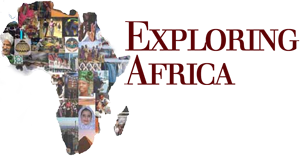Why Not Liberia?
***NOTE: the following piece of text on Liberia was written in 2003. Please understand that although it is written in present tense, the events described happened over a decade ago. You may find a more recent update at the end of this page.
While you were on summer vacation the world did not take a vacation! There has been a great deal of news from around the world, much of it reporting conflict and violence from Afghanistan to Iraq, from the Middle East to Liberia.
Many young people (and even adults!) in North America and Europe know very little about Liberia. In fact before this summer when the news media began carrying numerous stories on the on-going bloody civil war in Liberia, many of you may not have even heard of this relatively small country in West Africa.
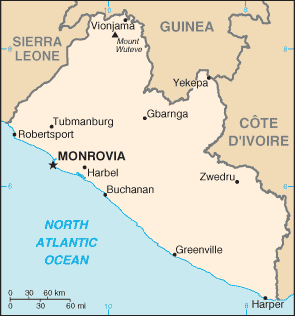 |
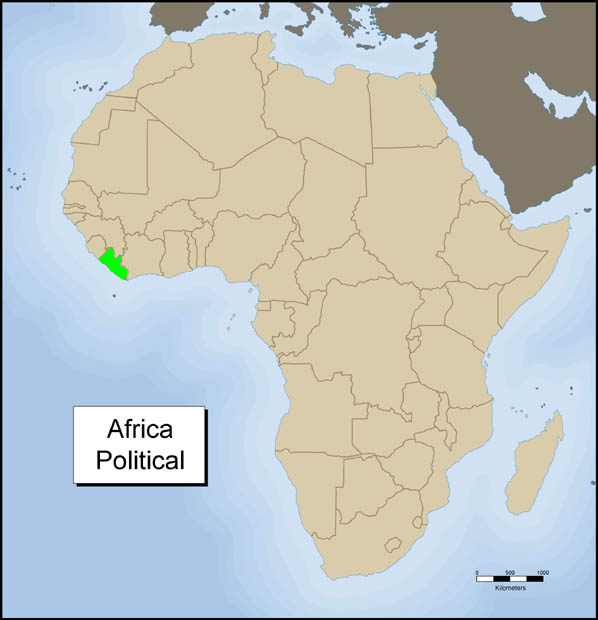 |
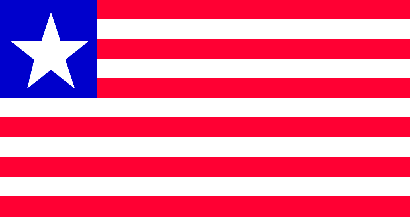
Liberia’s National Flag. Why does it have this design?
You will discover the answer by reading the following story.
Indeed, much of what we in North America read about Africa or see on the TV news relates to violence and suffering that has taken place in less than a dozen of the 54 countries in Africa. We are often not given the opportunity to read, see, or hear about the numerous countries in Africa which are not suffering from civil wars and violence. We would not be happy with the media in Europe or Africa if almost all of their coverage of news in the U.S. and Canada would focus on illicit drug use and crime. These are, of course, real problems, but there are many more important positive topics that should also be covered by the news media. The same is true for our coverage of the news in Africa. Our media should not ignore real problems like the civil war in Liberia, but these troubling stories should not be the only news that we receive from Africa.
When our media concentrates on stories of war and violence, we should try to find out as much as we can about the situation in the places reported on in order to better understand the reasons for these conflicts and how best they might be settled. More adequate coverage of these stories would include an examination of the U.S.’s role in such conflicts.
Last year we did a current events feature on the role of illicit diamond trade in funding the civil war in Sierra Leone, Liberia’s neighbor. In featuring the war in Liberia we will attempt to address two questions:
Why Liberia—how can we best understand the conflict in this country?
Why not Liberia—why has the U.S. been so reluctant to send peace keeping troops to Liberia to halt the terrible violence at the same time that the U.S. has more than 120,000 troops in Iraq?
Conflict in Liberia
As is the case for any major conflict anywhere in the world, the reasons for the Liberian conflict are complex, yet taking a look at how the history of the region is connected with what is happening today will help us to better understand it. Without the history of how power and oppression emerged in this region, one might be quick to draw on stereotypes of Africa to explain the war. For example, someone might say simply that African governments are corrupt or that war is a part of tribal cultures in Africa. But let’s take a closer look at whose hands were actually in the formation of Liberia and the escalating violence there.
The Formation of Liberia as a Country
Liberia was originally created as a country by freed Black slaves sent there from America in the early 1800’s. These former slaves became a ruling elite constituting about 5% of the population. The descendants of American slaves became known as Amero-Liberians. The rest of the Liberian population is indigenous to the region, and they ended up being oppressed by the new ruling elite. Resentment grew over the years towards this ruling elite. For more detail on the history of the formation of Liberia as a country, see Module 15: Activity 6: The Return to Sierra Leone and Liberia.
In 1980, a coup d’etat led by Samuel Doe, an indigenous Liberian, ousted the former regime of Amero-Liberians which had ruled Liberia for more than 150 years and installed his own. But he too marginalized the majority of the population politically by installing primarily people from his own ethnic group into the government.
The ability of Doe’s regime to stay in power is due at least in part to support from the United States of America. This was a part of the US Cold War policy. The US gave aid to Liberia out of fear that they would otherwise side with Libya or the USSR. Doe actually personally received 66% of the aid, rather than the US government giving it to the country as a whole. With these resources, he remained in power largely by terrorizing his own people. This enhanced ethnic divisions in Liberia since much of the violence carried out was targeted at certain ethnic groups. In 1988, just before Doe was ousted from power in a coup d’etat, the US cut off aid to Liberia.
The Civil War
In 1989, a group called the National Patriotic Front of Liberia (NPFL) crossed over the Liberian border from Côte d’Ivoire to overthrow Samuel Doe’s government. The NPFL was made up largely of the ethnic groups who had been marginalized by Doe’s regime as well as some mercenaries. This launched the beginning of a 7-year civil war (1989-1996) in Liberia. Much of this war was fought over control of areas that have precious resources, such as diamonds, gold, timber, rubber and iron ore. The leader of the NPFL was Charles Taylor. By 1992, he controlled most of Liberia, and in 1997 he won a hotly contested election for president of Liberia.
Charles Taylor as President
Since coming to power, Taylor’s opponents have begun the next wave of fighting in Liberia. The most prominent among these rebel groups are the Liberians United for Reconciliation and Democracy (LURD) and the Movement for Democracy in Liberia (MODEL). Taylor’s regime has been accused of serious human rights violations, controlling the media in Liberia, and supporting the civil war in Sierra Leone. In June 2003, Taylor was indicted for war crimes in the 10-year civil war in Sierra Leone. This launched a new surge of violence in Liberia again.
Regional Connections
The conflict in Liberia has regional connections. Before it came to power in the early 1990s, Charles Taylor’s National Patriotic Front of Liberia (NPFL) used military bases in neighboring Cote d’Ivoire to attack Samuel Doe’s government. Once in power, President Taylor openly assisted the Revolutionary United Front of Sierra Leone and its leader Foday Sankoh. Not surprisingly, the government of Sierra Leone was very up-set with Taylor and in recent years allowed the LURD and MODEL rebel movements to have bases in Sierra Leone from which they attacked the Taylor regime.
As was the case in neighboring Sierra Leone, none of the parties in long civil war in Liberia were capable of gaining and holding onto power long enough to stop the terrible violence. Outside assistance has been needed to reduce the high levels of destruction and violence. In both Sierra Leone and Liberia this outside assistance came first from intervention from neighboring countries. Beginning in 1990 the 16 member Economic Community of West African States (ECOWAS) sent a peace keeping force in to Liberia in an attempt to enforce a cease-fire between the warring parties. Unfortunately, while the ECOWAS force helped to reduce tensions this force was not able to bring an end to the fighting. The ECOWAS forces withdrew from Liberia after the election of 1997. In August 2003 ECOWAS soldiers once again entered Monrovia to enforce a ceasefire between the Taylor regime and LURD forces and to oversea the resignation and departure from Liberia of Charles Taylor on August 11, 2003. It was only after the direct intervention of Nigerian President Obasanjo who promised Charles Taylor safe exile in Nigeria, that Taylor agreed to leave Liberia. Charles Taylor and his family are currently living in Nigeria.
It is not only through providing peace keepers that Liberia’s West African neighbors have assisted in bringing an end to this conflict. Throughout the summer officials from ECOWAS countries have hosted a meeting of Liberians in Accra, the capital city of Ghana. These on-going meetings brought together representatives of the Charles Taylor’s regime, of LURD and MODEL (the two main rebel groups), and very importantly, other Liberian leaders representing the people of Liberia. The primary goals of these negotiations were to achieve an agreement on a lasting cease-fire between the three warring parties, establish conditions in which food and medicines could be imported and distributed to the many suffering civilians, and establish an agreed upon political frame-work for governing Liberia in the immediate future.
It is testimony to the skills and hard work of the ECOWAS diplomats and the Liberian leaders that an agreement between all parties has been reached on how Liberia is to be governed until democratic elections can be held in 2005. These negotiations were not easy and the agreement will not hold unless the international community is willing to provide Liberia with the material, political, and military support necessary to hold the peace.
ECONOMIC COMMUNITY OF WEST AFRICAN STATES (ECOWAS)
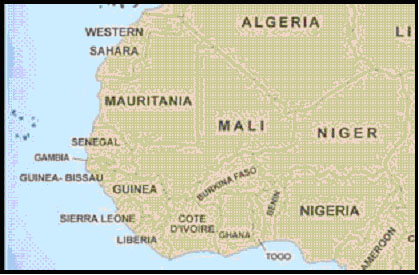
Seeing the Global Forces at Work in African Conflicts Africa has for a long time been a “playing field” of European and American economic and political interests. We see in the example of Liberia how the US established Liberia as a place to send repatriated slaves. This exploitation of African peoples as slaves and then disruption of the local scene in Liberia as they were sent back as a ruling elite was the source of an imbalanced power dynamic that divided people in Liberia according to ethnicity. The US support of another corrupt regime—Samuel Doe’s—exasperated further ethnic divisions. Furthermore, the wars in Liberia and Sierra Leone were largely funding by warring factions selling precious natural resources for weapons on the world market.
You can learn more about the impact of the Cold War on Africa from Module Ten African Politics, Activity Six
What Role should the United States Play in Liberia?
The current crisis in Liberia came to the attention of the world community at the same time as the conflict in Iraq. The conditions that persuaded President Bush and the U.S. lead coalition of nations to invade and temporary occupy Iraq are not dissimilar to the conditions that exist in Liberia. With Liberia, of course, there was no question of having weapons of mass destruction, however, Liberia was experiencing massive violence, wide spread death, the displacement of more than one half of its population, and the near total destruction of the political, economic, and social infrastructure of the country.
Based on the experience of severe civil strife in neighboring Sierra Leone and Cote d’Ivoire, Liberia’s neighboring states (ECOWAS) the African Union and the United Nation’s Security Council strongly urged international intervention in Liberia. While ECOWAS was willing to send a new peace keeping force into Liberia, the experience in Sierra Leone and Cote d’Ivoire demonstrated that ECOWAS did not have the resources on its own to establish and maintain peace and order. Peace was established in Sierra Leone when ECOWAS peace keepers where assisted by better resourced troops from the Britain, the former colonial power in Sierra Leone. Similarly, the civil war in neighboring Cote d’Ivoire was brought under control when a French peace-keeping force was deployed to assist West African peace-keepers.
As a result of these experiences, the United Nations, and the African Union strongly encouraged the United States to play a similar role in Liberia by providing a peace-keeping force to work along side of ECOWAS peace-keepers in Liberia. Why the U.S. and not France or Britain? Britain was the former colonial power in Sierra Leone and France was the former colonial power in Cote d’Ivoire, but Liberia, as you may remember, was one of two African countries that was never a colony of an external power. However, Liberia had always had a special relationship with the U.S. from its founding in the early 19th century up until current time. The nature of this special relationship is detailed in Module 15: Activity 6: The Return to Sierra Leone and Liberia.
Interestingly, it is not only external interest groups like the African Union, ECOWAS, and the UN that are encouraging the U.S. to become actively engaged in Liberia. The government and both rebel groups have strongly encouraged U.S involvement. Moreover, reports from international observers in Monrovia, Liberia’s capital, indicate that among the civilian population there is near universal support for U.S. engagement. In addition, almost all African advocacy groups in the United States have called upon the Bush Administration to send an U.S. peace-keeping force to Liberia.
In spite of the wide-spread support for U.S. engagement in Liberia and the great need for peace and stability in Liberia the U.S. government has not, to date, decided to deploy U.S. peace-keepers in Liberia. For just under two weeks after Charles Taylor resigned and went into exile in Nigeria there was a small (less than 200 soldiers) contingent of U.S. marines who went ashore from naval ships off the coast of Liberia to help ECOWAS troops secure the airport and sea port in Monrovia.
Why has the U.S. decided not to respond in Liberia? We cannot answer this question, since the administration has not provided a clear answer or policy statement on this crisis. However, we encourage you to investigate this question. You can do this by reading reports in major U.S. newspapers. All major newspapers have a searchable archive. You simply enter “Liberia” and follow the stories that cover the US government response to the crisis in Liberia.
In addition, you should investigate the U.S. Department of State website. This site carries all of the official statements on Liberia made by Secretary of State Colin Powell and other senior State Department officials.
Since this was written:
- In 2005, what is regarded as the most free, fair elections ever in Liberia were held, during which the first female president in the African continent, Ellen Sirleaf, was elected.
- in 2006, the government established a Truth and Reconciliation Commission to address crimes of the civil war
- In 2011, Ellen Sirleaf was reelected as president of Liberia. In the same year, she was awarded the Nobel Peace Prize.
- In 2016, the UN peacekeeping forces in Liberia, that were deployed in 2003, hand back full security responsibility to Liberia's army and police.
